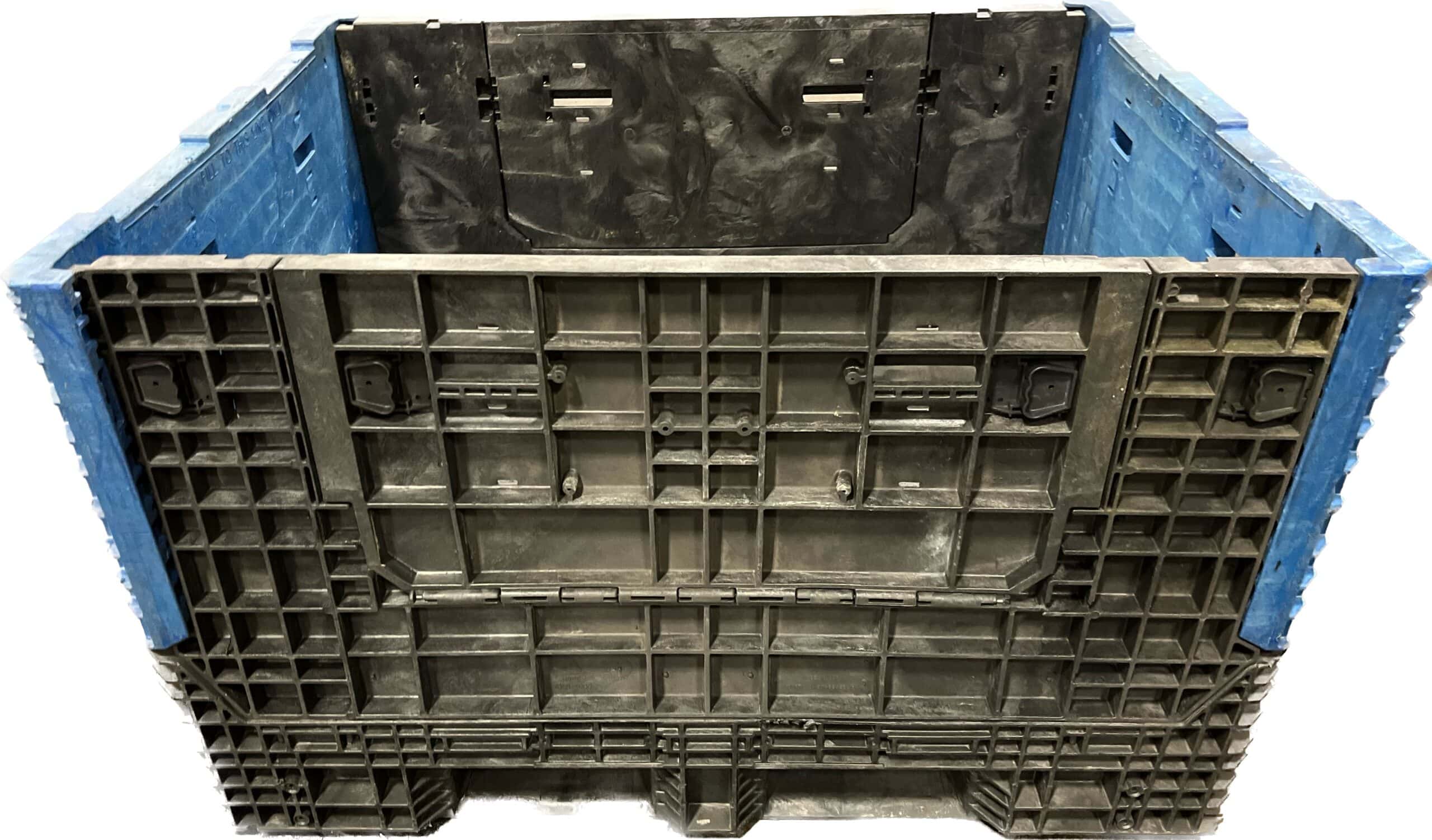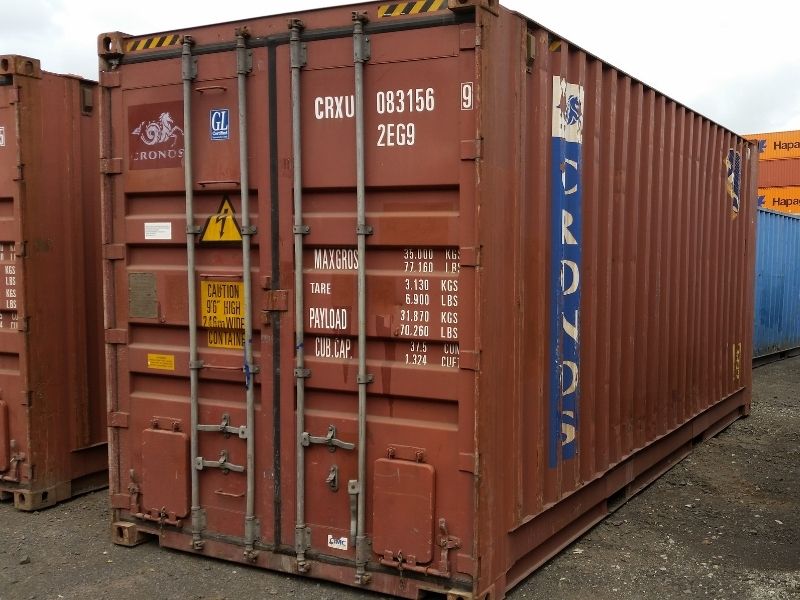Combining refurbished bulk containers and used collapsible containers for efficient storage use
The Ultimate Overview to Selecting the Right Bulk Containers for Your Organization Demands
Selecting the appropriate mass containers is vital for any kind of service that depends on reliable logistics. Different sorts of containers exist, each created for specific materials and applications. Aspects such as dimension, material compatibility, and regulatory requirements play a substantial duty in this decision-making procedure. Understanding these components can cause boosted operational efficiency. Many organizations ignore vital facets that can improve their overall effectiveness and sustainability. What are these considerations?
Understanding Different Kinds Of Bulk Containers
Bulk containers offer as important tools for services seeking reliable storage and transport remedies. These containers come in numerous types, each created to meet particular operational needs. One usual kind is the intermediate mass container (IBC), which is excellent for granulated and fluid products, using an equilibrium of ability and maneuverability. Another popular option is the mass bag, or FIBC, ideal for dry, flowable items. These adaptable containers are light-weight and can be quickly carried and kept. For much heavier products, stiff mass containers are commonly employed, supplying toughness and security for risk-free handling. Additionally, there are specialized containers tailored for hazardous materials, ensuring compliance with safety and security policies. Understanding the distinctive features of these mass container types enables businesses to make informed decisions that optimize logistics and lower prices. By selecting the ideal container, business can improve their operational performance and improve their supply chain processes.
Trick Material Considerations for Mass Containers
When choosing bulk containers, it is vital to contemplate the materials made use of in their building. Aspects such as stamina, chemical, and longevity compatibility play an essential duty in making certain the containers satisfy certain operational demands. In addition, weight and portability issues can influence both performance and transportation logistics.
Material Durability and Strength
Longevity and stamina are crucial elements in picking products for bulk containers, as they directly affect the container's ability to withstand different ecological conditions and managing procedures. Materials such as high-density polyethylene (HDPE), polypropylene, and stainless-steel are typically preferred for their robust homes, offering resistance to impact, temperature level, and abrasion changes. The choice of product also impacts the total life-span of the container; stronger materials usually result in less frequent replacements, causing set you back financial savings over time. Furthermore, the weight of the product can impact delivery expenses and convenience of handling. Businesses must consider their particular functional atmospheres and the capacity for deterioration to assure peak resilience and stamina in their mass container option.
Chemical Compatibility Factors
Comprehending chemical compatibility is necessary for picking mass containers, as the materials used need to resist the particular compounds they will certainly hold. Numerous elements affect compatibility, consisting of the chemical nature of the components, temperature level, and duration of storage. For example, corrosive chemicals may require containers made from stainless steel or specialized plastics that withstand destruction. Furthermore, responsive compounds can produce warmth or gases, demanding vented or pressure-rated containers. The option of container material, whether metal, polycarbonate, or polyethylene, should align with the chemical buildings of the stored compounds to avoid violations or leakages. Eventually, a detailed examination of these compatibility aspects assures secure handling and storage, safeguarding both workers and the atmosphere while maintaining item integrity.
Weight and Portability Problems
Choosing bulk containers entails not just assessing chemical compatibility yet additionally thinking about weight and mobility. Businesses need to assess the convenience of handling and transportation to enhance efficiency. Light-weight products like high-density polyethylene (HDPE) or light weight aluminum can assist in easier movement and decrease delivery expenses. Alternatively, much heavier containers might offer enhanced longevity but can impede wheelchair, specifically in environments requiring frequent relocation. In addition, the layout of the container need to enable for hassle-free lifting and piling, making certain ergonomic safety for workers. Firms ought to additionally consider the framework offered for transportation; as an example, containers compatible with forklifts or pallet jacks can enhance procedures. Inevitably, the right equilibrium between weight and transportability straight affects functional effectiveness and expense performance.
Sizing Your Bulk Containers for Ideal Performance
When sizing mass containers, services have to very carefully examine the measurements required to accommodate their certain products. In addition, weight capability is a crucial element that influences effectiveness and safety throughout transport and storage space. Effective Your Domain Name sizing not just takes full advantage of area however additionally optimizes functional operations.
Figuring Out Container Dimensions
Selecting the ideal measurements for mass containers is essential for taking full advantage of efficiency in storage space and transport. Services need to analyze their particular requirements, thinking about factors such as available room, the nature of the goods being kept, and the techniques of transport made use of. Accurate measurements ensure that containers fit preferably in vehicles and warehouses, reducing lost room and lowering dealing with time. Criterion dimensions can offer convenience, but custom measurements might be required for one-of-a-kind demands or to accommodate details products. Furthermore, it is very important to evaluate stacking capacities and availability, as these aspects influence general functional effectiveness. Inevitably, the ideal dimensions cause boosted company and structured logistics, benefiting the general productivity of the company.
Weight Capability Considerations
Comprehending weight capability is important for companies aiming to enhance their mass container performance. The weight capacity of a container straight impacts storage capacities, transportation logistics, and total functional prices. Choosing containers with the ideal weight limits ensures that services can securely store and deliver their goods without running the risk of damage or compliance concerns. Overwhelming containers can result in structural failures, while underutilizing ability lead to lost resources. It is necessary for organizations to examine their item weights and think about any regulatory needs when choosing containers. Additionally, elements such as the type of product, meant usage, and environmental problems need to also affect weight capacity decisions. By evaluating these components, services can enhance effectiveness and ensure a structured supply chain.
Governing Conformity and Safety And Security Requirements

Regulatory conformity and safety and security standards play an important function in the option of mass containers for businesses. Organizations must guarantee that their containers fulfill various laws established by local, nationwide, and global authorities. These criteria frequently relate to product safety, structural integrity, and correct labeling, which assist protect against accidents and guarantee the safe transportation of products.
Additionally, adherence to industry-specific guidelines, such as those from the Food and Medicine Management (FDA) or the Occupational Safety and Health And Wellness Administration (OSHA), is crucial for business handling hazardous products or food items. Non-compliance can cause fines, legal problems, or damage to a company's track record.
Companies need to additionally take into consideration the container's compatibility with the materials being stored or transported to prevent contamination or chain reaction (used collapsible bulk containers). To summarize, recognizing and implementing regulative conformity and safety requirements is vital for the reliable and liable use of mass containers
Sustainability Options for Eco-Friendly Mass Containers

Firms are additionally exploring alternatives made from recycled materials, which not just preserve sources but additionally support the reusing industry. In addition, innovations in design permit for lighter containers that require much less energy to transport, even more enhancing sustainability. By incorporating these eco-friendly bulk container alternatives, services can demonstrate their commitment to environmental stewardship while meeting customer demand for lasting methods. This shift not just aids the earth however can also improve brand credibility and client commitment.
Cost-Effectiveness and Budgeting for Mass Containers
While several businesses concentrate on sustainability, cost-effectiveness stays an important variable when choosing bulk containers. Organizations has to assess the first acquisition cost, along with long-term operational costs, to assure monetary practicality. Variables such as longevity, reusability, and maintenance play a significant function in establishing total expenditures.
Investing in top quality containers might produce greater in advance expenses yet can lead Visit Your URL to cost savings with decreased replacement rates and reduced waste. Furthermore, businesses need to take into consideration transportation expenses and storage space effectiveness, as these can influence the total spending plan.

Frequently Asked Questions
Just how Do I Identify the Right Container for Hazardous Materials?
To determine the ideal container browse around these guys for hazardous materials, one must evaluate compatibility with the substance, consider the container's product, check for regulatory conformity, and evaluate capacity and safety and security functions to assure appropriate handling and storage.
Can Mass Containers Be Custom-made for Specific Products?
Yes, bulk containers can be customized for certain products. used collapsible containers. Numerous attributes, such as size, style, and product, can be tailored to fulfill unique requirements, guaranteeing optimal safety and effectiveness for delivering and keeping different products
What Is the Typical Lifespan of Different Bulk Container Types?
The average lifespan of mass container kinds varies; plastic containers last 5-10 years, metal containers 10-20 years, and wood containers typically last 3-7 years, relying on use, maintenance, and ecological problems.
How Should I Tidy and Maintain Mass Containers?
To cleanse and keep bulk containers, one ought to consistently check for damage, eliminate deposit, wash with proper cleaning agents, wash completely, and warranty proper drying out before storage. Adhering to supplier standards enhances long life and safety and security during usage.
Are There Rental Alternatives for Mass Containers Available?
Yes, various business offer rental alternatives for mass containers, giving adaptability for services. These services can suit different requirements, enabling business to manage stock successfully without the commitment of purchasing containers outright.
Sturdiness and toughness are critical elements in choosing products for mass containers, as they straight influence the container's capability to stand up to different ecological problems and taking care of procedures. Comprehending chemical compatibility is essential for picking bulk containers, as the products utilized have to withstand the details substances they will certainly hold. Recognizing weight capacity is vital for companies aiming to enhance their bulk container efficiency. Regulative compliance and security requirements play a vital role in the choice of bulk containers for organizations. While numerous businesses concentrate on sustainability, cost-effectiveness continues to be a crucial aspect when selecting bulk containers.